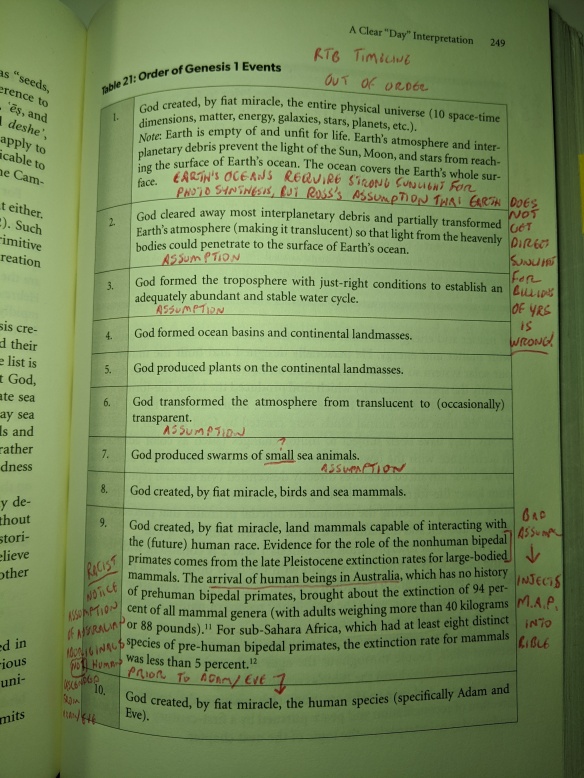A Clear “Day” Interpretation
Dr. Ross sent me his book almost a year ago and I finished reading it and annotating it within a few months. So, as I have gone back and read through the chapter again for the book review, I am not really finding anything new. From beginning to end, I have found that Dr. Ross although he claims that the Bible is his highest authority, he sees the modern academic paradigm as the highest interpretive authority and conforms his reading of the Bible to accommodate it.
In his personal testimony, we see evidence of this
I did not converse with a Christian about spiritual matters until I was 27. Studies in science consumed all my time and eventually convinced me, at age 15 that a transcendent God must exist. At the time, I doubted that a God who created a hundred billion trillion stars would care much about frail humans on an insignificant planet…In my first reading of Genesis 1, I saw indications that the creation days were long periods of time
If you teach people that the universe is billions of years old, by the time they are almost 30 years old (as Ross admits that he was) and have been indoctrinated by this mantra, they will try to fit everything they see into that worldview…including the Bible.
These are the parts of the text that Dr. Ross felt there was plasticity which would allow him to redefine the scriptures to accommodate the modern academic paradigm
The timing of Eve’s creation
He does not explain specifically here why he thinks this allows for creation days to be very long periods, but we can infer from a paragraph on the previous page why he thinks this is plausible. “Eve was created on the same day as Adam (the sixth) but not until after Adam took care of several large tasks.”
This sounds like the easily refuted argument that he used from chapter 7, when he claimed that Adam had four careers so the text could not possibly have been talking about a single day. His personal incredulity and injection of outside influence completely discounts Ross’s wild claim
The lack of an evening and morning for the seventh day
Clearly, Dr. Ross sees the importance of the evening/morning pattern when God revealed his creative works for 85% of the creation week. What’s not clear is why Dr. Ross takes the single example of missing morning/evening pattern and creates a rule for it. Dr. Ross’s shallow reading of the text ignores the deeper context and exegesis of Exodus 20 when the days are clearly defined with unmistakable 24 hour boundaries.
The Genesis 2:4 usage of the word “day” in reference to the entire creation week
So, at best, Ross can only say that the Hebrew word for day (yom) can have the colloquial understanding of a week of time…not the billions and billions and billions of years necessary to accommodate the modern academic paradigm. Biblical creationists agree that there is flexibility in the Hebrew word ‘yom’, but exegetically, it must fit the context, and in the context of Genesis 1, we can easily conclude from the text that it is signifying days as we know them today (24 hours).
I was especially intrigued by God’s creation hiatus following the six prolific creation periods.
We should all be intrigued by God’s creation hiatus, but it would be wildly bizarre to assume there were suddenly billions of years injected into the text from that thought
Finally, here was an explanation for the fossil record enigma
There are three things to keep in mind when interpreting scripture: context, context and context. When we view the scripture in context there was unquestionably a global flood that adequately (and more correctly) explains the fossil record…so the enigma is for the old earthist, who must redefine a world-consuming flood to mean a minor middle eastern rain storm and then create epicycles to explain both the text and modern observations
Dr. Ross continues at the bottom of pg242 and top of pg243 with the strange explanation for what it means to love the LORD with all of your mind
Loving God with “all your mind” means looking beyond the most simplistic interpretation of a given text, especially if that interpretation leads to complications and convolutions of other texts…Yet, ironically, a 24-hour creation day interpretation of Genesis 1 (and 2) complicates and convolutes at least aspects of God’s creation story – the sequence of events, the meaning of Adam’s work and words, and the speed of biological development.
Speaking of irony-> Just above Dr. Ross admitted that after almost 30 years of indoctrination in the modern academic paradigm, on his 1st reading of Genesis, his simplistic interpretation was that God created over billions of years…just as he’d been taught his whole life. So, clearly he’s only against OTHER people’s simplistic interpretation of Genesis 1.
Regarding his claim that the biblical creationist’s interpretation of Genesis 1 complicates and convolutes the aspects of the creation story, Dr. Ross AGAIN upholds the modern academic paradigm and demands that the Bible’s reading be conformed to those assumptions.
And as was shown in Chapter 4 and chapter 5 reviews when Dr. Ross attempted to claim that ALL of church history believed in old earthism, he was WRONG. Old earthism is a modern concoction that attempts to dissolve the modern academic paradigm into biblical interpretation, but as we see, they are like oil and water with no ability to mix.
On p244 Ross asks the question
How Did Adam Do So Much?…Similarly, for Adam to have named all of Eden’s animals within a few hours would seem to shrink not just the size but also the bounty of Eden…species
While I already covered Ross’s misunderstanding of scripture in my review of chapter 7, it doesn’t hurt to quickly address his repeated conflation of species and kinds. Kinds ≠ Species. The biblical kind is defined in Genesis 1 simply denoted a creature’s ability to reproduce at the time of creation. Since there have been many mutations, many creatures that were formerly able to reproduce lost the ability to reproduce. This does not mean they were not originally created as the same kind. But what this means is that Kind is more synonymous with the modern scientific distinction of family.
This means that Adam did not have to name millions of species as is claimed by Ross. Adam could have take care of his divinely-appointed job of naming the animals much more quickly by naming animals in groups
At the bottom of p244 Dr. Ross says
Young-earth creationists see as the futility of attempting to integrate Genesis with the scientific paradigm arises from a subtle error in applying a basic interpretive principle “Begin by establishing [not assuming] the point of view.” The result is a scientifically implausible order of creation events”
A few of things with this quote. Dr. Ross projects his own shortcomings in interpretation onto biblical creationists. Firstly, He conflates science with the modern academic paradigm as he has done throughout his book. Young earth creationists have no interest in trying to integrate Genesis with the modern academic paradigm. The observations of today are completely in accord with what we read in scripture. It is the old earthers like Ross, who have undertaken the mission of trying to integrate the modern academic paradigm with scripture. Secondly, the error is on the side of old earthers, who inject their assumptions from the modern academic paradigm into their biblical interpretation. Biblical creationists rather start with the basic interpretive principle that what God revealed in his word is true, so what we observe today is in accord with what He revealed in the Bible. Regarding his quote about the implausible order of creation events, you can see that Ross rejects the order of creation events that God revealed in scripture in order to accommodate naturalist assumptions.
On pg247-248 Ross unsuccessfully attempts to push the inconsistencies of his biblical interpretations with the observations onto biblical creationists.
A few purported conflicts between the Bible [old earth interpretations] and the fossil record have arisen…
The conflicts arise only for the old earther since the catastrophic worldwide flood is the only sufficient explanation for the observations. For the old earther, it is assumed that fossils were buried in the order that the soil-of-the-time was exposed as the top soil and that there were epochs when certain creatures did not exist. Dr Ross believes this imperative, but there are out-of-place (for the old earther) fossils that are discordant with those assumptions.
Genesis 1 gives the order of God’s creative works, but in both Dr. Ross’s posted timeline, which he posted years ago and on p249 we can see that Dr. Ross tries very hard to inject the modern academic paradigm into scripture

There are several problems with his chart, but I want to point out a particularly grievous problem in rows 9 and 10. Ross tells us that God’s last creative work was Adam and Eve, but just prior in row 9, Ross tells us that the Australian aboriginals emerged prior to Adam and Eve. This is both a terrible assumption and racist. Now, I do not believe Ross is a racist, but his views of the modern academic paradigm as an authority over scripture has resulted in a view that has racist implications.
As biblical creationists, we can praise God for the consistent nature of his revelation. We do not have to redefine the words in the Bible to accommodate modern academic paradigms or cultural changes in sexuality or political revolutions as we have seen Dr. Ross do. God’s Word is eternal and we can trust God to keep his word regarding the future since we can trust his revelation from the past.



